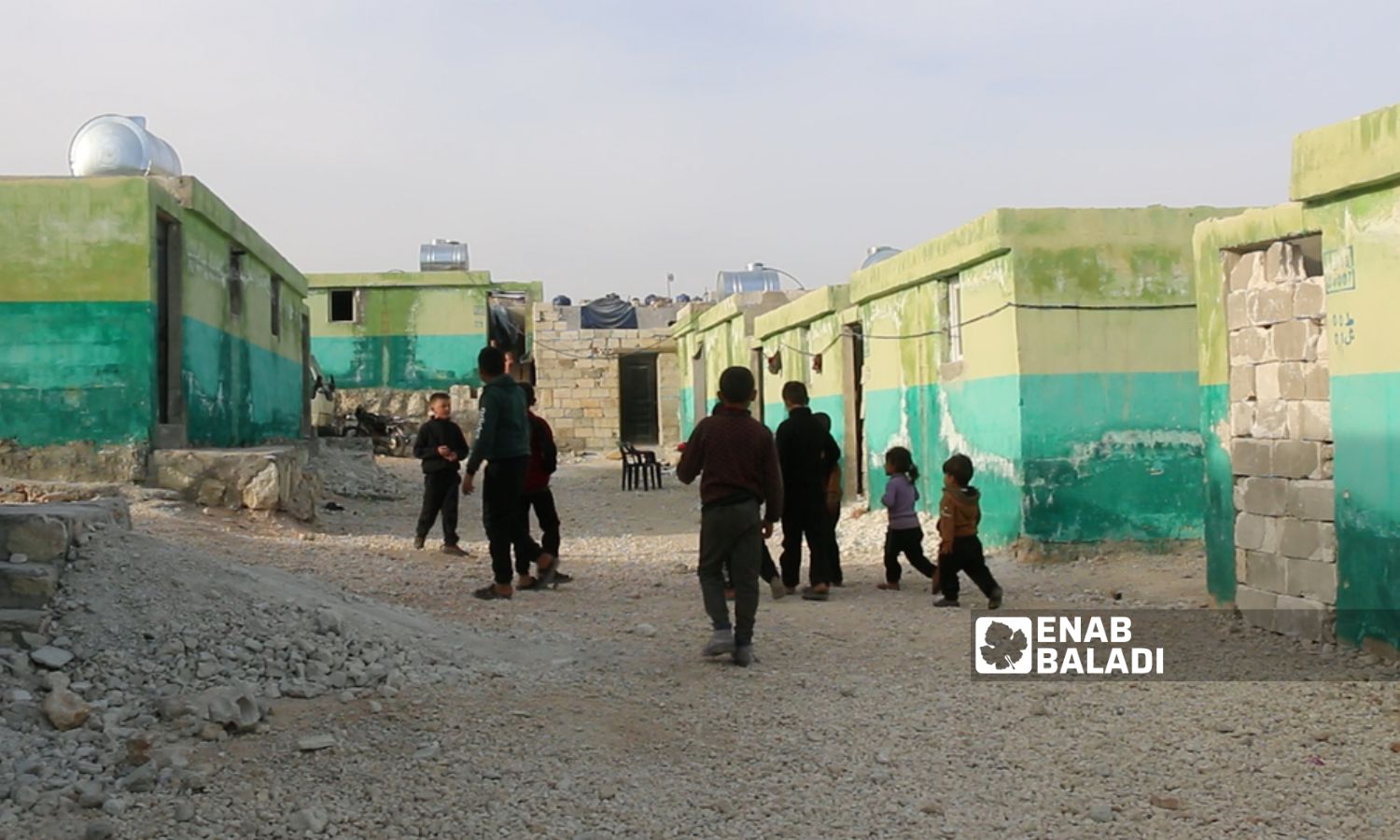



Enab Baladi – Idlib
“No bread, no electricity, no water, not even a food basket. We do not receive any aid in this camp,” Sabah Darwish, one of the earthquake-affected people in northern Salqin city, summarizes the reality of her current displacement in the al-Kuwaiti camp.
The effects of the Feb.6 earthquake disaster are still weighing on the lives of the people in northwestern Syria, in an area that was already suffering from food and health crises.
Darwish is one of those affected whose homes were destroyed by the earthquake, and she was forced to flee to another region.
Due to the lack of shelter centers available to those affected, and the fact that the management of some of them separated families between women and men, some families have headed to centers known for their lack of support in the hope that the situation will change after the entry of aid convoys.
Khaled al-Abdo, one of those affected by the earthquake in Jindires district, confirmed to Enab Baladi that no aid has yet reached the al-Kuwaiti camp in which he is currently residing, despite the appeal of some parties in the development ministry of the Syria Salvation Government (SSG).
Al-Abdo mentioned that he did not have the luxury of choosing a suitable shelter after the destruction of his house and the loss of all his possessions, and his only concern at that time was to secure shelter from the cold weather.
The most important thing al-Abdo lost after his displacement to the camp, in addition to the difference in his living situation, is the job that provided him with a simple financial income to meet the family’s need for food, in contrast to the current reality, as he begs for aid that has not yet arrived, he told Enab Baladi.
Ahmed Suleiman, one of those affected by the earthquake in Jindires, who was displaced to the al-Kuwaiti camp, complained that no aid had arrived, holding the SSG’s development ministry responsible for responding to his requests by saying that “there is no aid registered in his name,” he told Enab Baladi.
UN aid has entered northern Syria since February 10 (four days after the earthquake), and the number of trucks that entered until March 21 through the Bab al-Hawa border crossing reached 711 trucks.
The number of UN aid trucks that entered through the Bab al-Salama crossing reached 163 trucks, and 36 other trucks from the al-Raee crossing, carrying relief aid from “NFI” (non-food items) baskets, foodstuffs, and other materials.
Ali al-Hassan, director of the al-Kuwaiti camp, told Enab Baladi that about 34 families affected by the earthquake had fled to the camp from the areas of Jindires, Afrin, Harem, and Salqin.
Al-Hassan explained that the provided aid for these families consisted of heating materials from associations and donors under the direction of the SSG’s ministry of development, but he stressed that what was provided did not meet the needs of the people, indicating that the support provided to the permanent residents of the camp (470 families) in terms of bread and other things does not exceed the need, which does not allow aid distribution to the afflicted.
Amer al-Bashir, director of humanitarian affairs in the central region at the development ministry, told Enab Baladi, “The ministry published links to register the affected people, and in our role, as the directorate of humanitarian affairs, we carried out the process of counting and verifying the families affected by the earthquake and all those registered.”
Regarding the distribution mechanism, al-Bashir explained that the humanitarian teams initially went to the most affected areas to cover the needs of the people there.
Since the first hours of the earthquake, the teams worked on counting and field verification of the affected families, placing each affected family under a specific item, according to the damage it suffered, and according to the family’s need, according to al-Bashir.
He added that the aid initially targeted the severely affected families, such as those who lost their homes due to the earthquake, and then the less damaged, then the least, until the aid included all the people who were affected by the earthquake.
Al-Bashir acknowledged that the amount of aid that entered the affected areas is “small” compared to the magnitude of the disaster and the required need, stressing that there is a “major shortage” in aid after the earthquake affected more than 42,000 families in Idlib, as the amount of aid received is not sufficient to cover all the affected areas.
The World Food Program (WFP) has requested urgent funding of a minimum of $450 million to continue aid to more than 5.5 million people across Syria until the end of this year, including $150 million to provide food assistance for six months to 800,000 people affected by the earthquake.
The WFP warned that it would have to “sharply” decrease the number of beneficiaries from its services by next July if sufficient resources were not available.
For its part, the World Health Organization (WHO) issued its urgent appeal in response to the earthquake disaster in Syria to secure $33.7 million, calling on donors to support its response.
The UN organizations have registered more than 103,000 displaced people in northwestern Syria since the earthquake occurred on February 6, in an area where at least 4.1 million people need humanitarian assistance.
if you think the article contain wrong information or you have additional details Send Correction